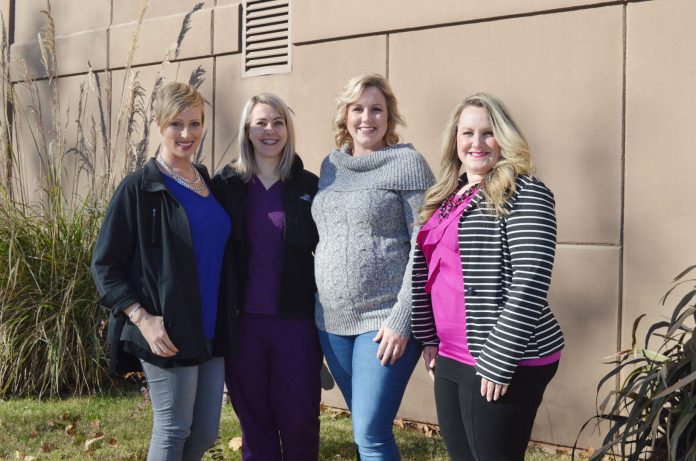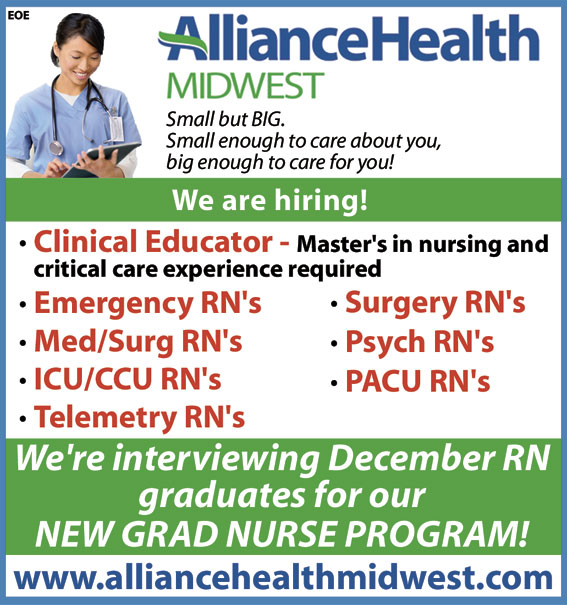
CAREERS IN NURSING
YWCA VOLUNTEER NURSE EXAMINERS BRING HOPE AND HEALING
by Traci Chapman – staff writer/photographer
YWCA Oklahoma City and nursing might not seem on the surface to be connected – but, in fact, nurses are an integral part of the organization’s mission.
Those nurses are volunteers in an interconnected program that helps those who are at their most vulnerable – scared, many times alone, always injured, whether it be physically, emotionally, financially or a combination of all three. They are sexual assault and domestic violence nurse examiners, and they advocate for victims in ways that go far beyond traditional healthcare.
“An examination is physical, when needed – we look head-to-toe for injuries, we collect forensic evidence, this is an excellent way to assist in a case on behalf of the victim,” said Amanda Kemp, YWCA OKC director of forensic examinations. “But, this is not intrusive, but rather therapeutic – we want to make sure we don’t retraumatize someone.”
The sexual assault and domestic violence nurse examiner program has taken a system in ways broken and, at times, damaging to the victim. Before, many of those victims would come into an emergency room and asked to wait – often for several hours – until they could be examined. The process, when through, could end up only making the assault they had only gone through worse, said Karla Doctor, YWCA OKC senior officer of sexual violence prevention and response.
“Our nurses are on call and go directly to the hospital to conduct the examination, and victims are kept more shielded, not forced to sit in a public emergency department as they feel their most vulnerable, are scared, injured and can think of nothing else but what’s just happened to them,” she said. “These nurses can accomplish more in a single exam than what many might people would even imagine.”
That examination, of course, includes a physical exam – treating and documenting trauma and injuries, as well as forensic evidence collection. While victims can decide not to file a police report, SANE and DVNEs collect that information in case an individual changes their mind later. Nurses also evaluate the need for treatment like emergency contraception or STD prevention. Examinations and medications – as well as advocacy and therapy services – are provided free of charge to patients.
But, perhaps most importantly, Kemp said, nurse examiners and the YWCA sexual response advocates who take part in the examination provide support to someone who might be feeling unimaginable guilt, shame and pain.
“We make a difference because we are there – obviously, we are there to take care of the physical examination, to make sure the victims receive the best possible medical treatment, but there is so much more to it,” Kemp said. “There are the forensic aspects, the importance to preserve evidence and the emotional care for victims who can feel victimized again if an exam isn’t conducted properly.”
Nurse examiners can face an emotional tightrope in dealing with victims. Some want justice, while others do not want to face everything entailed in filing a police report relating to sexual and violent assault. Most importantly, they many times need support in a climate that might – perhaps, even subtly – blame the victim for the incident; even with family and friends, there are often feelings of shame that can lead those victimized down an even darker path, Kemp said.
“So many come forward and nobody believes them – how good a forensic nurse would I be if I didn’t believe them and didn’t collect as much evidence and information as possible, whether they want to report or they’re a case of non-report,” she said. “There are also so many who blame themselves because maybe they were drinking, perhaps there was a consensual situation that led somewhere else.”
“Sexual assault is never a natural consequence – no one deserves to be sexually assaulted,” the forensic exam director said.
The same can be said for domestic assault victims, individuals who are at the mercy of a master manipulator. In those cases, abuse very well might not be physical – sometimes not at all – but the damage still runs deep.
“There is, of course, the mental abuse – many victims are isolated by their abusers, held hostage even to an extent, and then there is the economic abuse,” Doctor said. “A lot of abusers put all of the debt in their victim’s name, they might keep them from working by saying, ‘oh, I want to take care of you’ – but it’s really just a way to keep that control.”
While nurse examiners from the start move beyond traditional medical evaluation procedures, it is after that exam is over that they truly might make a difference, not only for one victim for many. SANE and DVNEs maintain evidence chain of custody and nurses testify as fact witnesses during hearings and at trial.
“A statement made to a nurse examiner can be an exception to the hearsay rule, and that statement can be allowed in the case,” Kemp said. “Everything they tell us is documented, along with evidence of physical injuries – having a nurse be able to represent your story helps.”
Those impacted by domestic violence and sexual assault also have available to them a variety of resources offered by the YWCA to help them after the examination is over. The organization has shelters for those who need them, as well as offering counseling and educational programs that can help a victim move beyond what’s happened to them.
The need for examiners is high, Kemp and Doctor said. The organization’s SANE and DVNEs conduct about 425 to 475 examinations a year. While that number is staggering, what is more alarming are the numbers of women who never receive any kind of examination or treatment, women who are afraid or embarrassed and never report an incident at all.
“I think we should be doing thousands of exams,” Kemp said. “About 90 percent of college students assaulted don’t report for a variety of reasons, and that’s frustrating and frightening.”
YWCA officials hope nurse examiners will turn that tide. Both sexual assault and domestic violence nurse examiners work to empower victims, letting them know that no matter the circumstances of their assault, they are not to blame – and they are not alone.
“Sexual assault is a community issue that moves far beyond victims, their families and the programs that are trying to help them,” Kemp said.
To reach all those who need it, however, YWCA OKC needs RNs willing to step outside a traditional medical environment, individuals willing to volunteer their time and skills to help vulnerable patients who are suffering far beyond any physical injuries they might have. In doing that, Kemp said she and her staff have experiences beyond anything she ever would have expected.
“I get to make a difference with each patient, I get to see them change from a person in crisis to calm and empowered,” she said. “We let them know we believe you, we care, and we can make such a difference in that instance.
“We save lives, sometimes not even realizing the difference we’ve made until much farther down the road,” Kemp said.
Nurses who wish to become sexual assault or domestic violence nurse examiners must have been a full-time practicing RN for a year with an active license and must maintain state-required continuing education, as well as other administrative requirements. Volunteers also complete 30 hours of crisis services training, Kemp said.
To register for SANE training or for more information about taking part in the program, go online to YWCA OKC’s website, located at http://www.ywcaokc.org/volunteer or contact the organization’s outreach director by emailing [email protected] or calling 405-948-1770.

Small but BIG.
Small enough to care about you,
big enough to care for you!
We are hiring!
· Clinical Educator – Master’s in nursing and critical care experience required
· PACU RN’s
· Emergency RN’s
· Med/Surg RN’s
· ICU/CCU RN’s
· Telemetry RN’s
· Surgery RN’s
· Psych RN’s
We’re interviewing December RN graduates for our new grad nurse program!
www.alliancehealthmidwest.com
EOE












